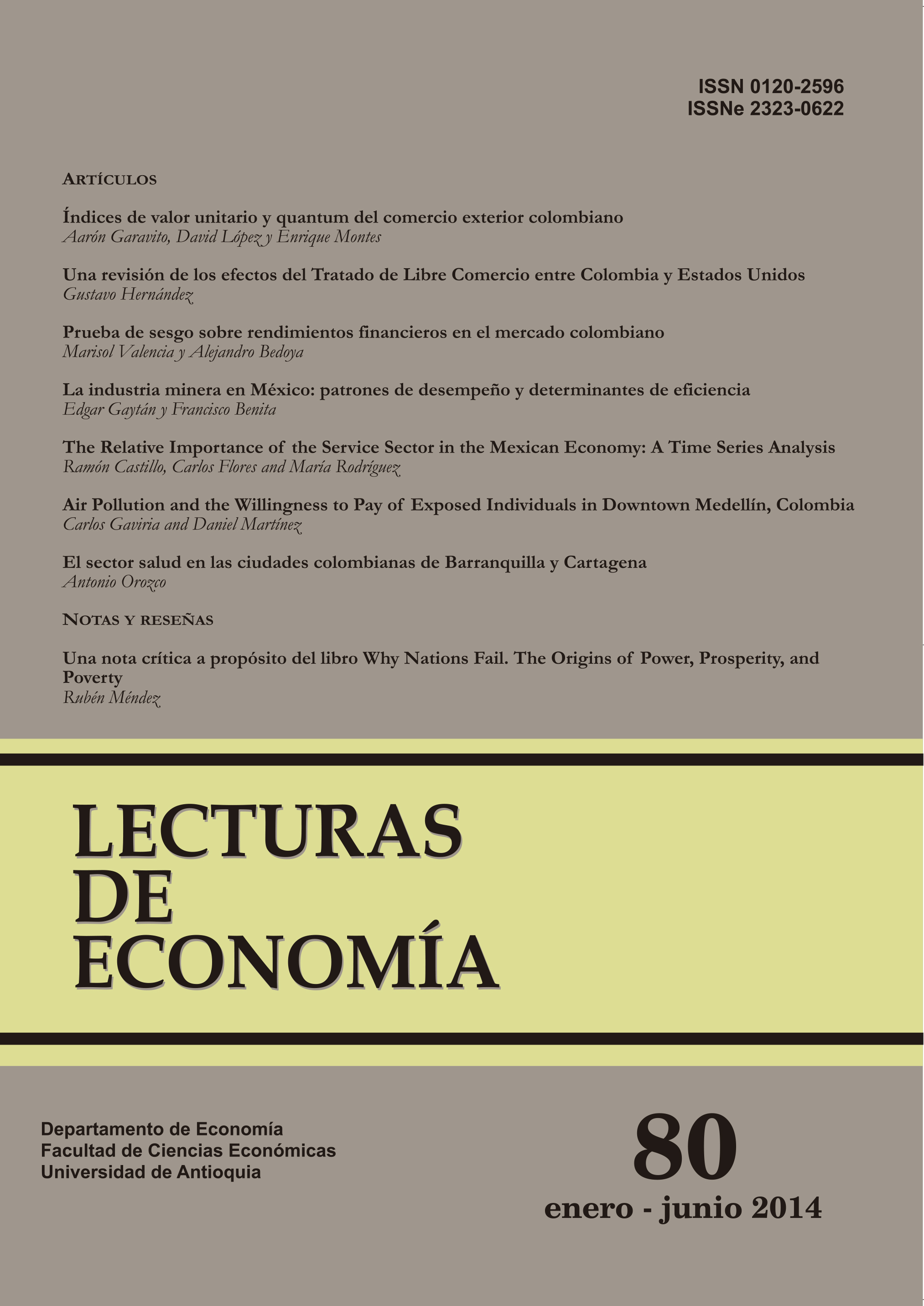Una nota crítica a propósito del libro Why Nations Fail. The Origins of Power, Prosperity, and Poverty
DOI:
https://doi.org/10.17533/udea.le.n80a8Abstract
Las instituciones conceptualizadas como reglas del juego 1(North, 1990), desarrollan los derechos de propiedad y representan un aspecto esencial para que se produzcan, asignen y utilicen los bienes económicos −entendidos como toda entidad tangible o intangible que potencialmente puede servir para satisfacer alguna necesidad humana−. Por lo tanto, nos encontramos frente a un fenómeno complejo (Hayek, 1964; 1967) que involucra la evolución del tejido social.
Downloads
References
Acemoglu, Daron y Robinson, James A. (2012). Why Nations Fail? The Origins of Power, Prosperity and Poverty. New York: Crown Publisher.
Acemoglu, Daron y Robinson, James A. (2012). ¿Por que fracasan los paises? Los origens del Poder, la Prosperidad y la Pobreza. Barcelona: Deusto S.A.
Alonso, José Antonio y Garcimartin, Carlos (2008). Collective Action and Development. The Role of Institutions. Madrid: Editorial Complutense.
Alonso, José Antonio (2012). “Why Nations Fail. The Origins of Power, Prosperity and Poverty”, Revista Principios Estudios de Economía Política, No. 21, pp. 165-170.
Aoki, Masahiko (2007). “Endogenizing Institutions and Institutional Changes”, Journal of Institutional Economics, Vol. 3, Issue 01, pp. 1-31.
Baumol, William (1990). “Entrepreneurship: Productive, Unproductive, and Destructive”, The Journal of Political Economy, Vol. 98, No. 5, pp. 893-921.
Fernández, Daniel y Méndez, Rubén (2013). “A Preliminary Conceptual Model of Money, Credit and Currency from the Basis of Monetary Theory in The Austrian School of Economics”. En: Cachanosky, Juan C.; Lingle, Christopher y Leube, Kurt (Comp.), Una vida Santa dedicada a la Libertad: Ensayos en honor Joe Keckeissen (pp. 39-68). Buenos Aires: Instituto Acton Argentina.
Greif, Avner (1998). “Historical and Comparative Institutional Analysis”, The American Economic Review, Vol. 88, No. 2, pp. 80-84.
Hayek, Friedrich A. (1964). The Counter- Revolution of Science: Studies on the abuse of reason. London: The Free Press of Glencoe Collier-Macmillan Limited.
Hayek, Friedrich A. (1967). Studies in Philosophy, Politics and Economics. Chicago: University of Chicago Press.
Hoppe, Hans-Hermann (1995). Economic Science and the Austrian Method. Alabama: The Ludwig von Mises Institute
Kirzner, Israel M. (1978). Competition and Entrepreneurship. Chicago: University of Chicago Press.
Landes, David (1999). Wealth And Poverty Of Nations. Londres: Abacus.
Mccloskey, Deirdre (2006). The Bourgeois Virtues: Ethics for an Age of Commerce. Chicago: University of Chicago Press.
Mccloskey, Deirdre (2010). Bourgeois Dignity: Why Economics Can’t Explain the Modern World. Chicago: University of Chicago Press.
Méndez, Rubén (2011). “Institutional Innovation, Deregulation and Competition in a Structured Society”. In HDR Expo 2011. Sydney: Macquarie University Faculty of Business and Economics Press.
Méndez, Rubén (2013). “An Introduction to the Paradigm of Institutional Coordination as an Alternate Mechanism for an Extensive Economic Analysis”. In GLEA Lecture Series 2013. Italia: Free University of Bolzano.
Mittelstras, Jürgen (2011). “On Transdisciplinarity”, TRAMES, No. 15, Vol. 4, pp. 329–338.
Mosterin, Jesús (2009). La Cultura Humana. Barcelona: Espasa.
Mosterin, Jesús (2012). “Herencia genética y transmisión cultural”, Evolución, Vol. 7, No 12, pp. 71-86
North, Douglass (1990). Institutions, Institutional Change and Economic Performance. Cambridge: Cambridge University Press.
North, Douglass (1991). “Institutions”, Journal of Economic Perspectives, Vol. 5, No. 1, pp. 97-112.
Rothbard, Murray (1997). “Praxeology: The Methodology of Austrian Economics”. In: The Logic of Action One: Method, Money, and the Austrian School (pp. 58-77). Cheltenham, UK: Edward Elgar.
Downloads
Published
How to Cite
Issue
Section
License
Copyright (c) 2014 Rubén Méndez

This work is licensed under a Creative Commons Attribution-NonCommercial-ShareAlike 4.0 International License.
This page, by Universidad de Antioquia, is licensed under a Creative Commons Attribution License.
Authors who publish with this journal agree to retain copyright and grant the journal right of first publication, with the article licensed under a Creative Commons Attribution-NonCommercial-ShareAlike License allowing others to share it as long as they acknowledge its authorship and original publication in this journal.
Authors can enter into separate, additional contractual arrangements for the non-exclusive distribution of the journal's published version of the work (e.g., post it to an institutional repository or publish it in a book), provided that these arrangements be not for profit and the journal be acknowledged as the original source of publication.
Authors are permitted and encouraged to post their papers online (e.g., in institutional repositories or on their websites), as it can lead to valuable exchanges as well as greater citation of the published work.







